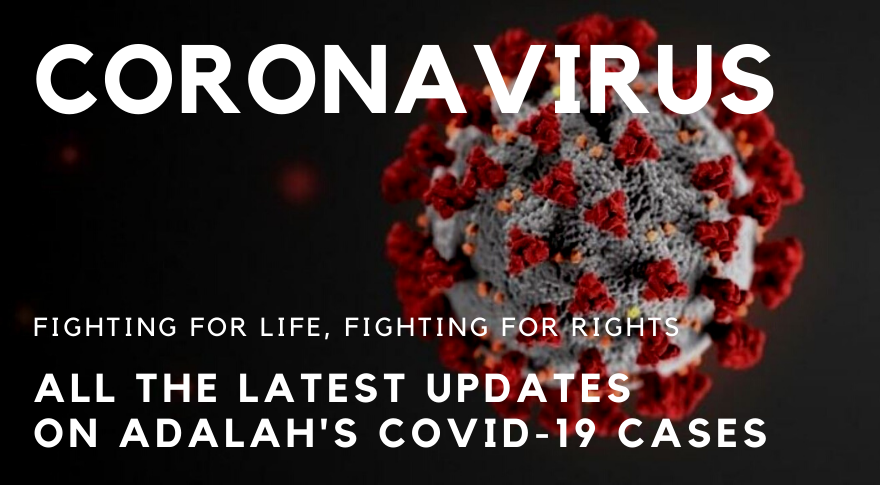Adalah files urgent Israeli Supreme Court petition: Coronavirus testing for 150,000 Palestinians in East Jerusalem
Adalah – The Legal Center for Arab Minority Rights in Israel today, 8 April 2020, in coordination with the Civic Coalition for Palestinian Rights in Jerusalem, submitted a petition and a request for urgent hearing to the Israeli Supreme Court against the Israeli Ministry of Health demanding coronavirus testing for 150,000 Palestinians with Israeli-issued Jerusalem ID cards living in Kufr Aqab, the Shuafat refugee camp, and the adjacent neighborhoods.
These areas are located behind the Separation Wall, and while officially they are part of the jurisdiction of the Jerusalem Municipality, in fact, there receive no services, including no access to coronavirus testing. These residential areas are among the most overcrowded and densely-populated neighborhoods in Jerusalem, which puts residents at grave risk for contracting and spreading the coronavirus. The Israeli Health Ministry is responsible for the ensuring the health and well-being of these residents, as the Palestinian health ministry is not allowed to give them any services.
Shuafat refugee camp in Jerusalem (Photo: Hiba Aslan)
The petition was filed by Adalah Attorneys Suhad Bishara and Myssana Mourany on behalf of Adalah, Munir Zagier, the Chairman of the Northern Neighborhoods Committee (Kufr Aqab), four residents of Kufr Aqab, and four NGOs in the Shuafat refugee camp: the Palestinian Child Center, the Feminist Center, the Al Quds Association for Training and Special Education, and the Youth Center.
The petitioners asked the Court to issue an order to show cause (“order nisi”) requiring the Health Ministry to explain and legally justify the following:
Why there is no coronavirus testing of the 150,000 Jerusalem residents living in four neighborhoods including Kufr Aqab, Samiramis, Al-Matar and Zagier, as well as for residents of five neighborhoods including the Shuafat refugee camp, Ras Khamis, Ras Shehadeh, the Dahayat al-Salam and the new Anata neighborhood:
- Why there are no drive-in test centers or an accessible mobile testing complex for the neighborhoods’ residents;
- Why not to train local clinics in these neighborhoods to conduct such coronavirus tests; and
- Why not order any additional remedies to make the coronavirus detection tests available to residents of these neighborhoods.
Adalah argued in the petition that according to the Health Ministry’s own criteria these neighborhoods must be given priority in accessing corona tests, and that the ministry’s failure to do so amounts to endangering the residents’ lives. Not only are the existing health facilities in these neighborhoods extremely poor, but also the Health Ministry did not provide any basic infrastructure to prevent the spread of the coronavirus, as it did in other communities. In these neighborhoods, there are no health clinics that provide any preventive care for the virus; the Magen David Adom (MADA) emergency ambulances do not come to these areas; there is no coronavirus testing; there is no training for residents; and there is no information provided to residents about the virus by the Health Ministry.
In the Shuafat refugee camp, there is an UNRWA clinic that serves only residents who carry a refugee certificate. However, this clinic is also not authorized and is not prepared to carry out such tests. UNRWA’s policy is that COVID-19 testing is done by the host government designated laboratories as part of the country-wide COVID-19 response.
The petitioners are unaware of any coronavirus tests for any of the 150,000 residents of these neighborhoods. A recent UN OCHA report noted that: "There is an unconfirmed number of Palestinian patients with COVID-19 in East Jerusalem."
The Palestinian residents of these neighborhoods are behind the Separation Wall but at the same time, they are part of the Jerusalem Municipality's jurisdiction. They are not under the Palestinian Authority’s responsibility but at the same time, in order to travel to other parts of Jerusalem for treatment, they must cross checkpoints, as if they are crossing a state’s borders, which makes it very difficult for them to access health services. Especially at this time, and in light of the myriad of restrictions placed on the residents’ movements even to leave their homes, the residents' access to any services provided in Jerusalem is very minimal.
Moreover, in these neighborhoods, women, the elderly, people with disabilities and children are much less independent in terms of their mobility, and thus have little ability to access health services in other parts of Jerusalem. A significant number of women and the elderly do not drive, have no access to private cars, and there is no public transport. If someone is experiencing coronavirus symptoms, this person must be transported by a family member in a car and through checkpoints, also increasing the risk of infection to the family member-driver. If at all possible, such a trip will take at least one and half hours in each direction. Residents fear that, in fact, they will not be able to travel to Jerusalem even if symptoms develop and even if they meet the criteria for coronavirus testing. Further, restrictions placed by the PA from 25 March 2020 also prohibit most movement between East Jerusalem and the rest of the West Bank, between West Bank governorates, and between and inside West Bank cities and villages.
The petitioners emphasize that the Israeli Health Ministry’s failures violate the constitutional right to life, which impose upon the state an obligation to take steps in accordance with the Basic Law: Human Dignity and Liberty. In addition, these omissions contradict the rule of law as the Health Ministry also fails to comply with other relevant laws relating to the maintenance of health and patient rights. The ministry’s failures amount to such an extreme deviation from its own criteria, which it set for the purpose of fulfilling the obligations imposed on it by law, and therefore, the ministry is violating the principle of equality before the law, as it applies to upholding the right to life.
Case Citation: HCJ 2471/20, Adalah et al. v. Ministry of Health (case pending)
CLICK HERE to read the petition [Hebrew]











